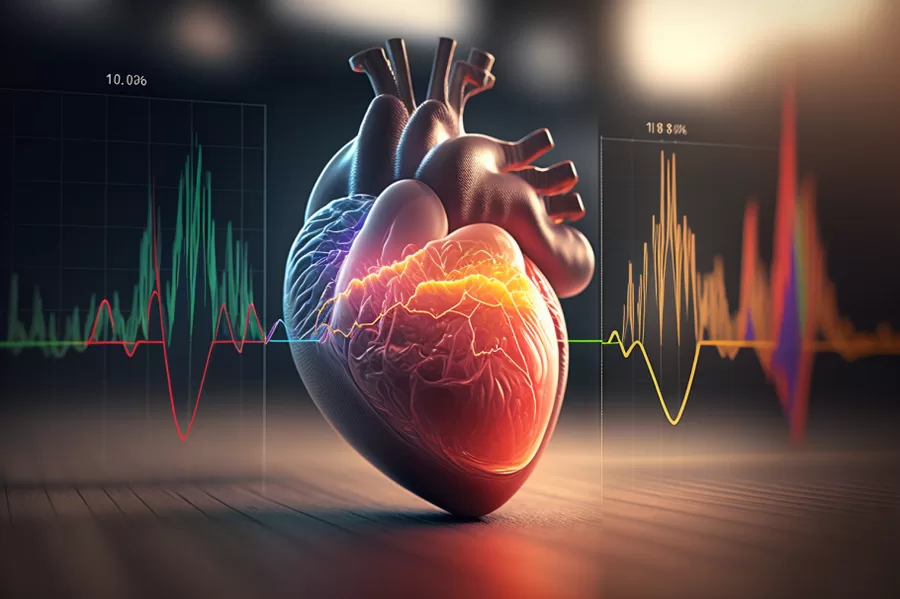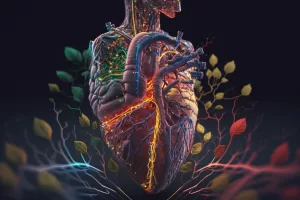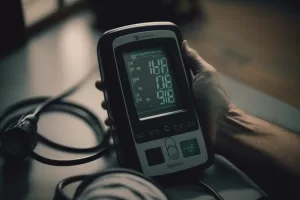Based on the data provided by the CDC, 47% of Americans suffer from hypertension. However, this figure may still be far from the actual situation, as according to the WHO, 46% of people don’t even know about them being hypertensive. The main hazard of such a situation is that these people apply zero effort to prevent strokes and heart attacks.
Understanding the size of the issue, people must know how to manage hypertension with and without meds. In this review, we’ve collected some of the best techniques to help you keep your numbers under control. Also, you’ll find some explanations about the reasons and risk factors making your blood pressure go up.
What Is Hypertension?
Hypertension refers to a medical condition provoked by high blood pressure. In the norm, your numbers should stay within 120/80 mmHg – 129/80 mmHg regardless of physical activity you have. If those figures approach or exceed 130/80 mmHg regularly, you may be diagnosed with arterial hypertension. On the other hand, the WHO defines this disease as blood pressure reaching 140/90 mmHg.
Causes
Your problems with blood pressure may have been developing for years without you knowing about them. The reason this often goes unnoticed is a lack or insignificance of symptoms. To prevent the disease, it’s worth learning about the causes of this medical condition. Here are some of the most common ones:
- Renal disease;
- Diabetes;
- Hormonal imbalance provoked by thyroid disorder and other health disorders;
- Lupus;
- Atherosclerosis;
- Sleep apnea.
Among other causes of high blood pressure is the intake of certain medications. For instance, certain birth control, NSAIDs, steroids, antidepressants, and cough preparations can make your numbers outgrow the norm.
Risk Factors
It’s not only your medical condition that may impact your developing hypertension. A range of risk factors increase your chances of getting it anytime throughout your life. Some of them can be prevented, while others cannot. Check them out.
- Age. As people age, their blood vessels lose elasticity and become thicker, thus causing a gradual rise in blood pressure numbers.
- Hypertension running in the family.
- Your ethnicity and race. There is convincing scientific evidence that people of some races are more prone to developing high BP. According to the CDC, non-Hispanic black adults are 6% more likely to get this disease compared to non-Hispanic white adults and 10% compared to non-Hispanic Asian adults.
- Gender. Statistics say about 50% of men will develop arterial hypertension during their lifetime, while only 44% of women will face the same problem.
- Lifestyle factors. These include smoking, alcohol consumption, unhealthy eating habits, and a sedentary way of life.
Excessive weight and obesity. Due to the growing percentage of fat in the bodies of overweight people, their blood vessels get damaged and cannot fulfill their function the way they are supposed to. Besides, the growing load on the heart of obese people adds to the problem, skyrocketing their chances of dealing with high blood pressure.
Symptoms and Complications
Among the primary reasons for the high mortality of hypertension is that people don’t feel any symptoms of the disease. Even if your numbers reach 180/120 mmHg, there is a chance you won’t feel it. A 10-year community prevalence study of severe asymptomatic hypertension among people with high blood pressure revealed that 2.15% don’t have any symptoms of the disease and, therefore, do nothing to control it. The latter results in damage to the blood vessels, heart, kidneys, and other organs and systems that have to adapt their function to excessively high numbers.
Some people do experience a range of symptoms signaling hypertension. They include but are not limited to:
- Headache;
- Chest pain;
- Trouble breathing;
- Nausea and vomiting;
- Blurred vision;
- Dizziness;
- Feeling cold.
Why is it so important to keep track of your BP numbers and measure them? The reason is hypertension can have severe consequences for your life and health. People suffering from this disease are at high risk of developing heart disease, heart attack, or stroke.
Lifestyle Hypertension Management
Hypertension self-management begins with bringing changes to your lifestyle. Below, you’ll find hypertension management guidelines regarding what should be changed and how.
Diet
How to manage hypertension with the help of a diet? Doctors and nutrition specialists have several recommendations that should be followed by people dealing with elevated or high blood pressure.
- Start a DASH diet. DASH stands for Dietary Approach to Stop Hypertension. While it brings no specific foods to your meal plan, DASH sets daily and weekly nutrition goals. This diet recommends people with high blood pressure enrich their meals with whole grains, veggies, fruits, low-fat dairy products, lean meat, fish, nuts ad seeds.
- Cut back on salt. Sodium reduction is another way to help your BP numbers go down. There is scientific evidence claiming that reduced sodium intake allows for decreasing your blood pressure as well as reduces mortality and morbidity from cardiovascular health issues.
- Eating potassium-rich foods is great for your cardiovascular health. You can get potassium from bananas, greens, apricots, avocados, and grapefruit.
- Moderate alcohol. While low doses of alcoholic drinks might be safe, excessive or frequent consumption will most likely lead to high BP. By cutting back on such drinks, you can resolve your health issue or at least improve it.
Exercise
Physical activity is essential for a healthy heart and hypertension management. Regular aerobic exercises allow making your heart stronger. Due to this, the organ can pump more blood with less effort, thus decreasing the pressure on the blood vessel walls. Due to this, your hypertension symptoms may improve.
Aerobic exercises tend to be the best for heart health. Choose any exercise you like. Brisk walking, jogging, swimming, or cycling – they all work well.
If you think physical exercises are not for you, check out these tips to change your mind and get started easier.
- Don’t wait for tomorrow, start today.
- Ask your friend or a family member to join you.
- Set small goals and reach them daily.
- Choose exercises you enjoy.
Stress management
Stress is associated with elevated levels of cortisol, which is the hormone affecting your entire body. Its impact makes your blood vessels get narrower, thus provoking elevated blood pressure. By eliminating or reducing stress, you have every chance to bring your numbers to the safe norm.
Easier said than done? We know it, but you should try your best to make this possible. There exist dozens of effective techniques to manage stress. Yoga and all sorts of breathing exercises can come in handy when you need to cope with stress.
Meditation
It’s not only your mind that needs relaxation, but your body as well. Meditation is a great way to dive deep into yourself and give your body the rest it needs. Progressive muscle relaxation that takes place during meditation is scientifically proven to manage high blood pressure in people diagnosed with hypertension.
Weight Loss
Excessive body mass is one of the leading risk factors for hypertension. The growing body size requires your heart to work times harder for your body to function. Continuous load on the organ leads to the development of heart disease and vascular issues.
Doctors claim that losing 2 – 4 kilos of weight can reduce your systolic BP by 3 – 8 mmHg, which is a great start to a healthier life.
Medication for Hypertension Management
If lifestyle changes are not enough for effective hypertension management, you should see your doctor and ask for medicinal treatment. Several classes of meds can be used for arterial hypertension. These are:
- Diuretics;
- ACE inhibitors;
- ARBs;
- Calcium channel blockers;
- Beta-blockers and others.
Let’s see how each of them can help.
Diuretics
Their efficacy is explained by the ability of diuretics to promote the excretion of sodium and water. This way, the amount of circulating fluid and, therefore, blood in your body reduces. This your BP goes down.
ACE Inhibitors
These work by inhibiting the secretion of angiotensin – the hormone responsible for constriction of the blood vessels. The dropping levels of this substance allow for arteries relaxation, which helps the reduction of blood pressure numbers.
Angiotensin II Receptor Blockers (ARBs)
The mechanism of action of these meds is somehow similar to what ACE inhibitors do. ARBs reduce the production of angiotensin, leading to the dilation of your blood vessels and a drop in blood pressure.
Calcium Channel Blockers
The aim of calcium channel blockers is to prevent calcium from entering your blood vessels and heart. Why do we need it to stay out? The reason is calcium promotes the contraction of arteries and veins. Such medications prevent this from happening and help your blood vessels relax and reduce pressure on the walls.
Beta Blockers
This type of medication blocks the effects of adrenaline – the hormone produced in the human body when under stress. Due to this, your heartbeat slows down and BP numbers reduce too.
Others
Depending on the causes of your condition and its severity, your GP may recommend taking some other meds. For instance, vasodilators, alpha-blockers, central agonists, and others.
How to Take Medications Effectively
The essential hypertension management rule is to stick to your doctor’s recommendations. By no means should you use any preparations without consulting a healthcare specialist. Also, your treatment will be more effective if you follow these simple pieces of advice:
- Take the exact dosage of medicines you’ve been prescribed. An insufficient dose won’t bring the desired effect, while excessive puts you at risk of severe and rapid drop in blood pressure.
- Ingest the pills at the same time daily, to keep their levels steady throughout the day.
- Make sure your BP meds don’t interact with your other treatments.
- Don’t miss dosages.
Monitoring and Tracking Progress
To understand if your hypertension management techniques work, you should monitor your blood pressure. Not only this will help you keep track of your condition but will also let you know if your treatment works. Besides, by regularly monitoring your number, you can see your progress or a lack of it and give your doctor grounds to titrate your dose accordingly.
How to Measure Blood Pressure at Home?
The best types of BP monitors to use at home are aneroid and digital ones. They are easy to use and provide accurate measurements, essential for proper monitoring. Make sure you use the monitor correctly:
- Don’t do anything that may trigger high BP at least 30 minutes before taking measurements.
- Sit comfortably when using the monitor. Your back and arm should be supported.
- You’d better measure your numbers at the same time daily.
- Don’t use the monitor over clothes.
It’s best to check your numbers twice daily: in the morning and in the evening.
Tracking and Interpreting Results
It’s worth mentioning that a single episode of high blood pressure does not equal a hypertension diagnosis. To know if there are any reasons for concern, track your numbers for at least several days. A blood pressure log can come in handy for this purpose. Write down your results daily. If they exceed 130/80 mmHg, you’d better make an appointment with your GP. If your numbers stay within 140/90 mmHg, you shouldn’t delay a visit to the doctor’s office.
Summary
Arterial hypertension can be insidious, which is why tracking your numbers is essential. If you see a tendency towards your BP increase, use hypertension management techniques presented in this guide and see your doctor for more details and medicinal treatment if there’s a need for any.
FAQ
What are some hypertension management techniques?
Bring changes to your lifestyle. Eat healthy foods, do sports, and stay active throughout the day. Make sure to reduce stress and stay away from unhealthy habits.
How to manage hypertension?
Start with understanding the problem. Check with a doctor to get professional advice and medicinal treatments if you need them. If you are overweight, try to lose some extra pounds by eating healthily and doing some aerobic exercises. Take care of your blood sugar levels if you have diabetes. Once you succeed in those tasks, you’ll take control of the disease.
Is hypertension treatable?
Yes, it is! You can treat and prevent this condition by following the guidelines given in this article and keeping to your doctor’s advice.
What are 5 exercises to reduce hypertension?
Aerobic exercises do best for managing this disease. The top 5 include:
- Brisk walking;
- Cycling;
- Swimming;
- Hiking;
- Weight training.



